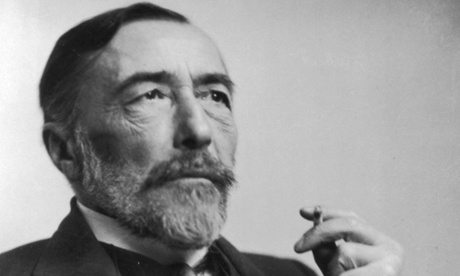This month on the Reading Group, we’re looking at Joseph Conrad’s Victory, 100 years after the great modernist’s novel was first published.
The final word of the book, Conrad said in an author’s note that appeared with the first edition, was written on 29 May 1914. “And that last word was the single word of the title.” By the time the book came to be published, that word had taken on an unexpected resonance. “Those were the times of peace,” wrote Conrad of the period when he was finishing the book. By the time it was published in 1915, Europe was at war. Conrad said that he agonised over his title as a result, worrying that Victory might fall “under the suspicion of commercial astuteness deceiving the public into the belief that the book had something to do with the war”. Conrad also worried that his chief villain, a thuggish hotelier named Schomberg, had “the psychology of a Teuton”. He pointed out that he too came from the time of peace, as “an old member of my company” who first appeared in Lord Jim, back in 1899.
This concern of Conrad’s about being seen to cash in is interesting in all kinds of ways. It shows something of the necessary delicacy of the outsider during a time of national crisis – here was a Polish novelist, writing in his third language, anxious not to upset his adopted countrymen and women. It shows his recognition of how circumstances can change the way a book is read; this is worth bearing in mind in the 21st century, when Conrad is so often viewed through the lens of post-colonial politics. It also shows how arbitrary such apparently significant choices can often be. A few months earlier, Conrad’s friend Ford Madox Ford had published a novel called The Good Soldier – and (if we are to believe Ford) had given it that name precisely because cashing in on the war was thought to be a good move.
But the titles of Victory and The Good Soldier have more in common than this coincidence. They resonate through both stories and take on dark irony. The soldier’s “goodness” becomes a major question in Ford’s novel. In Victory, meanwhile ... Well, we’ll see what kind of victory it is as we go through the month. At this stage, let’s just say it isn’t easily won. And it’s one of the things that make Conrad’s last pre-war novel so challenging and powerful.
Ford described Conrad as “a great poet and novelist”, adding “I imagine that few men have had much more power to see vividly the opposing sides of human characters ...” He wasn’t referring to Victory when he said that, but it’s a novel that exemplifies Conrad’s ability to see and, indeed, as one of his character’s once said, “to make you see”.
FR Leavis, in The Great Tradition, named Conrad as one of his four great novelists alongside Jane Austen, George Eliot and Henry James, saying of Victory that even if it was “a work of so decidedly a lesser order than Nostromo ...”, it was still “among those of Conrad’s works which deserve to be current as representing his claim to classical standing; and of the novels ... it is the one that answers most nearly to the stock notion of his genius ...”
But don’t let that put you off. Because Victory is also a book of great humanity and compassion, a compelling and exotic narrative that can be read for pleasure as much as for anything it will do to top up your appreciation of classical genius. Hopefully, you’ll join the reading group this month as we read through – and hopefully, you’ll love it.
By way of encouragement, we have five copies of the fine new Penguin edition (packed with notes, appendices, various old introductions and a fine new one by John Gray) to give away to the first readers in the UK to post: “I want a copy please” – along with a nice, constructive comment relevant to its author – in the comments section below.
If you’re lucky enough to be one of the first to comment, don’t forget to email Laura Kemp with your address (laura.kemp@theguardian.com), as we can’t track you down ourselves. Be nice to her, too.
Finally, some advance warning. Next month sees the first publication of a new Rebus novel: Even Dogs in the Wild. I thought it would be fun to trace the story of Ian Rankin’s gloriously grouchy old detective through the years, starting with his first appearance in Knots and Crosses and hopefully also moving on to some of his later, deeper and darker cases ... Onwards!










